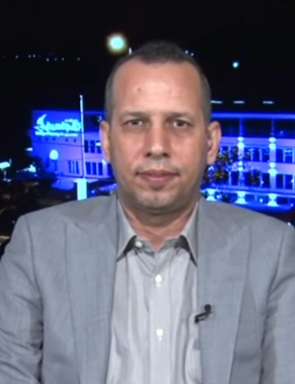Top Qs
Timeline
Chat
Perspective
Hisham al-Hashimi
Iraqi historian and researcher (1973–2020) From Wikipedia, the free encyclopedia
Remove ads
Hisham al-Hashimi (Arabic: هشام الهاشمي; 9 May 1973 – 6 July 2020) was an Iraqi historian and researcher in security and strategic affairs and extremist groups, and a specialist on the subject of the Islamic State and its supporters.[2][3][4][5] He also was an advisor to the Iraqi government on counter-terrorism.[6]
Remove ads
Biography
Al-Hashimi was born in 1973 in Baghdad. He became a historian[7] and researcher[8] in security[9] and strategic affairs.[10][11][12] He was a follower of the Iraqi Islamic groups since 1997.[13] He worked in the field of modern and "jurisprudential" manuscripts, although his academic achievement was Bachelor of Economics and Administration - Statistics Department. He held a scientific degree in Hadith, and had an interest in the history of Al-Dhahabi.[14] He was arrested and sentenced to prison by Saddam Hussein's regime, due to his affiliation with Salafi jihadism, then he was released from prison in 2002.[15] After 2003, he went to work in the press, began writing reports and documents with foreign newspapers and channels, and began writing a blog about the map of armed groups in Iraq.[16][17][18][19][20] He published more than 500 articles and research in Iraqi and Arab newspapers and magazines about extremist groups.[21][22][23] On 1 July 2020, he published a report titled "The internal dispute within the Popular Mobilization Forces", his last work before his assassination.[24]
Remove ads
Assassination
On 6 July 2020, al-Hashimi was shot outside his home in Zayouna, Baghdad by two unidentified gunmen on a motorcycle.[25][26] He died in the nearby Ibn Al-Nafees hospital shortly after arrival.[27] In July 2020, a BBC investigation said Kata'ib Hezbollah was implicated in al-Hashimi's death.[28]
He was buried at Wadi-us-Salaam, Al-Najaf, Iraq.[29]
Aftermath
Summarize
Perspective
Al-Hashimi's death triggered an uproar in Iraq and among the larger international community,[30][31][32] leading to allegations accusing paramilitary groups such as Kata'ib Hezbollah and the Islamic State,[1] while the official investigation has not accused any group, and no group claimed responsibility. However, Al-Hashimi had reportedly received direct death and kidnapping threats from members and commanders within Kata'ib Hezbollah and the Popular Mobilization Forces.[33][34]
On 8 July 2020, Iraqi Prime Minister Mustafa Al-Kadhimi visited the family of al-Hashimi—his wife, three sons, and daughter—to offer his condolences. He described al-Hashimi as "a personal friend and adviser" and hailed him as a "hero," vowing to bring those responsible for his death to justice.[35]
In July 2021, four men were arrested including former police officer Ahmed Hamdawi Owayid al-Kinani who confessed that he assassinated al-Hashimi with a licensed gun, as he had previously worked in the Ministry of Interior.[36] In May 2023, a court in Baghdad sentenced al-Kinani to death for the murder of al-Hashimi.[37][38] Al-Kinani's conviction was later overturned by an appellate court and he was released in 2024; it is unknown what the grounds for acquittal were.[39]
Places of work
- Director of the National Security and Counterterrorism Program at the AKD Center for Strategic Studies and Research.
- Security Adviser to the Iraqi Journalists Syndicate.
- Member of the Scientific Committee of the Baghdad Conference on Combating Terrorism.
- Lecturer in combating terrorism in security academies.
- Visiting Scholar at the Rivers Center for Strategic Studies.
- Member of the team of advisors of the Committee for the Implementation and Follow-up of National Reconciliation in the Office of the Prime Minister of Iraq.
- Security Adviser to the Iraqi Journalistic Freedoms Observatory.
Remove ads
Publications
References
External links
Wikiwand - on
Seamless Wikipedia browsing. On steroids.
Remove ads

